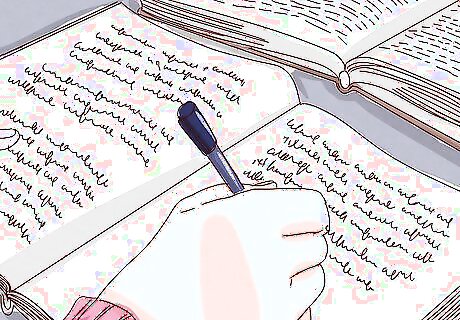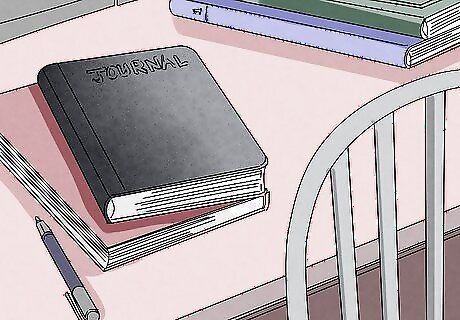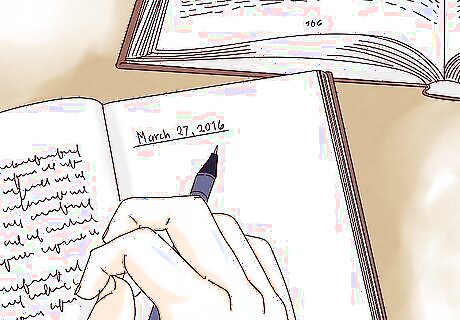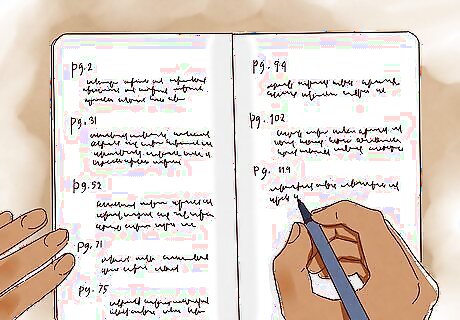
views
- For school, review your assignment and create a log template with appropriate categories, then read your book and write down all the key information.
- For personal use, buy a journal you like and keep it near your favorite reading spot, reading carefully so you can write and take notes as you go.
- A reading log lets you take note of observations you make, improving your long-term development and reading comprehension.
Keeping a Log for School

Review your assignment. If you are keeping a reading log for school, be sure you are clear about your assignment's expectations. Depending on your class and your individual teacher, you might include very different kinds of information in your reading log. Read your assignment sheet carefully and discuss it with your teacher if you have any questions. Some items you will likely have to include in your log are: The title and author of the book The dates you read which page The amount of time you spent reading each day Key themes of the book Major characters and plot developments Questions you have as you read

Create a reading log template with appropriate categories. You can create your reading log in a school notebook or in a computer document. Create a template that has spaces for you to write about all the necessary categories you need to address in your log. Some pre-made templates also exist online. Just search for "reading log template" in your favorite search engine.

Store your log safely. Be careful when you store your reading log, especially if you have to turn the log in for a grade. Keep your reading log in a safe place that won't have drinks spilled on it. If your log is electronic, be sure that you save your work and have it backed up on an external hard drive or a cloud drive.

Read your assigned texts. If you have to do a reading log for school, chances are that you have specific reading assignments to include on your log. Sometimes you might have some flexibility in your assignment, such as if you have to read 5 novels in a semester. Other times you might have a specific assignment, such as if you have to read 20 Emily Dickinson poems in a given week. Give yourself a lot of time to complete your reading assignment. Remember that keeping a reading log will take a little more time than simply reading a text.

Record the full bibliographic citation information. Most reading log assignments will ask you to maintain a careful bibliographic citation. This will allow you to cite your sources properly and return to your texts at a later point. Be sure that you note down: The book's title The author The publication date The publisher and city where the publisher is located Any other identifying information (such as the edition used, translators, co-authors, etc.)

Enter all your reading assignments. Books, poems, academic reading, and other materials (even movies or TV shows) can all be included in your journal, depending on the parameters of your assignment. Never put off entering a reading assignment until later! You might lose track of your work and forget important details.

Read slowly and attentively. Don't try to rush through your reading assignments: take your time and think carefully while you read. Pay attention to key details while you read so that you don't have to reread portions. It will save you time in the long run if you aim to retain information while you read. Take down a few notes as you read, especially if you have questions. Jotting out the main theme of a passage or your question about a chapter while you're reading will help you fill in the information in your log later.

Write down important factual details of the book. Many reading logs will ask you to keep track of the nuts and bolts of a text. These are details that are purely factual and do not require any extra interpretation or analysis. Such details include: Plot elements Character names Setting Key argument (if the text is nonfiction or academic)

Copy important passages. Most reading logs will ask you to identify quotations and passages that strike you as significant or worthy of further analysis. Look for quotations that you find intriguing, mysterious, confusing, or nuanced. These quotations might be used as evidence for your analytical papers later on. Don't forget to note the page number and speaker whenever you copy a passage.

Write down your questions. Whenever you think of a question as you read, you should note it in your reading log. These can be abstract questions (such as "Why is it important that the characters speak in riddles?") or content-based questions (such as "Who is the mysterious man in the cloak?"). These questions can be used in future journal entries.

Note your personal observations. Think about connections between the book and your own life. Is there anything in the book that reminds you of your own thoughts, feelings, or activities? Is there anything that you particularly love or hate? Think about your feelings, not just your thoughts, as you journal.

Use your observations to make analytical claims. Some instructors might ask you to begin making analytical claims as you read. You can use your informal reading log as a tool to help guide other formal assignments such as papers, response essays, or annotated passages. Think about how passages relate to one another, and consider the historical or social significance of the work you are reading. Begin to form hypotheses about how the text operates and why it is important.

Think about how your reading relates to your other academic work. If you are in a literature class, think about how your assigned texts relate to one another. If you are keeping a reading log about scientific journals, look for patterns that can help you organize your readings into categories. How would you classify each of the texts that you read? Are there any texts that substantiate one another? Are there any texts that disagree with one another? Do your texts help you think about your other classes or homework assignments differently? Note these observations in your reading journal.

Write a formal journal entry. Some reading logs might involve the writing of formal journal entries. Rather than simply listing bullet points or noting passages, you must write a journal entry in full sentences and paragraphs. Ideally, your journal entry should explore a single theme in some kind of depth. This will allow you to build connections between passages and formulate a mini-argument about the text's significance. An excellent first step to writing a formal journal entry is finding 3 or more passages that explore a common theme, such as justice, love, or despair. Use your journal entry to explore how this common theme is treated in these different passages.

Act like a teacher. As you continue keeping a reading log, you should be building your reading, writing, and analytical skills. Eventually, you should consider yourself to be an expert on the books you read. Put yourself in a teacher's frame of mind when you write your journal, and use your entries as a way to "teach" a text to others. Rather than simply asking questions, begin to formulate answers to your questions.

Focus on your long-term development. Look at your reading log not only as a way to track what you read but also as a way to track how you improve over time. Ideally you should be writing down gradually richer questions, comments, and journal entries over the course of the semester. Try to get a little more sophisticated with each reading log entry you write. Try to write fewer content questions (such as what happened in the story) and more interpretive questions (such as why the book is significant).
Keeping a Personal Log

Purchase an attractive journal. In order to stay motivated, purchase an attractive blank journal that is easy to write on. Many stationery and book stores have journals for sale. Depending on your tastes, you can purchase a lined or unlined journal. You can also choose to purchase a journal with a plain, simple cover (such as a black leather cover) or one that is more decorative and whimsical. If you expect to keep the journal for a long period of time, try to purchase one that has archival paper. This will keep the pages from yellowing and degrading over time.

Keep the log near your favorite reading spot. Encourage yourself to maintain your reading log by storing it in a safe place near your favorite place to read. This might be your bedside, your coffee table, or on an end table next to your favorite reading chair. Make sure it is easily accessible and that you store it in the same place consistently: otherwise you might lose or forget about it. It is also wise to keep a working pen in the same location.

Read actively and widely. In order to make a reading journal worthwhile, you will have to make the time to read. Introduce yourself to new ideas, authors, and concepts by reading a wide variety of materials in many styles and genres. This will help keep your reading log interesting. In order to encourage yourself to read more, you should: Read every day, even if only for a few minutes Turn off the television and resolve to read instead Feel free to stop reading books you hate--don't view reading as a chore Get recommendations for excellent books from friends and family Join a reading group at your local school or library

Read slowly and carefully. It can be tempting to read books at a fast pace, especially when they are page-turners. However, this can hurt your ability to think about what you read and can even make you more likely to forget you ever read the book. Slow down and take your time with the books you enjoy. Savor the phrases, reread your favorite passages, and take a few minutes to consider the meaning of what you are reading.

Write down the bibliographic information for everything you read. Be disciplined about jotting down the important information for every book, poem, or essay you read. Note the author's name, the title of the piece, the year it was published, and the publisher's name. This will help you track down the book at a later date if you wish to reread it. It will also help you make recommendations to your friends and begin to understand your own favorite books and authors. Do not skip over this part, assuming that you are bound to remember a book's title and author. People are liable to forget even these details over time, so they are the most important pieces of information to write down.

Include the dates of when you read. Because your reading log is serving a journal-like function, write down the dates when you read. Understand how what is going on in your own life might affect your reactions to and thoughts about the books you read. Your future self will be grateful to you for taking the time to write down these dates.

Write down page numbers of your favorite passages. Especially if you own the book you are reading, be sure to write down the page numbers of your favorite passages. You will always be able to return to these excellent quotations if you have this information written down. If you like, you could even copy out your favorite passages into your journal, though this can be a more time-consuming task than jotting down your favorite pages.

Take notes while you read. Reading is a complicated task, and your thoughts will be constant and ever-changing as you read. You will not be able to write down every thought you have, but you should try to keep hold of your most important observations so you can remember them. Every reader will want to write down different kinds of things, but you can use the following guiding questions to help you decide what to include in your log: Who are your favorite and least favorite characters? Why? Have your thoughts about any of the characters changed? What do you find fascinating about the plot? Are there mysteries to solve? Do you like the author's style? Are there any distinctive elements to the author's style that make it stand out? What would you have changed about the book if you were the author? Does the book help you understand something about your world, about another country, or about history? How does the book remind you of what's going on in your own life? What are your personal reactions to the book?

Reflect on the book once it's complete. Your thoughts about a book might change drastically over the course of reading it. Take some time once you have finished the whole book to reflect on its meaning and significance. Ask yourself what your favorite and least favorite aspects of the text were. What surprised you? How did your thoughts change between the beginning of the book and its conclusion? Write for 10-15 minutes after finishing the very last page in order to preserve these reflections.

Reread your personal reading journal. A reading journal is most effective when you can go back and reread your observations and reactions. Every year or so, flip through your reading log. Do you see any patterns or common themes in your reading? Has your reading helped you process the events of your own life? Reading your journal will help you understand how your tastes have grown and changed as well as how your own life has grown and changed.




















Comments
0 comment